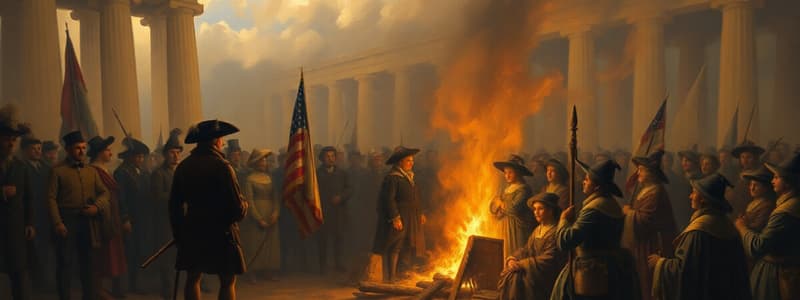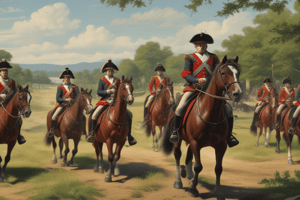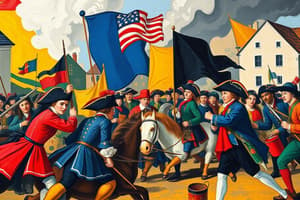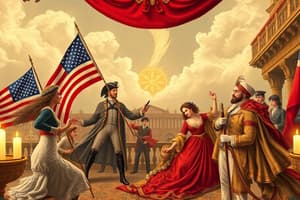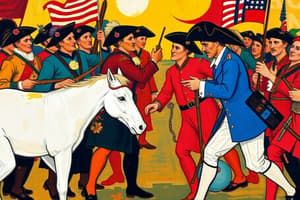Podcast
Questions and Answers
What was the primary reason for the colonists' objection to direct taxation imposed by Parliament?
What was the primary reason for the colonists' objection to direct taxation imposed by Parliament?
What event is known as the Boston Massacre?
What event is known as the Boston Massacre?
Which act was the first to provoke significant anger among the colonists?
Which act was the first to provoke significant anger among the colonists?
What was the outcome of the Boston Tea Party?
What was the outcome of the Boston Tea Party?
What did the First Continental Congress aim to achieve?
What did the First Continental Congress aim to achieve?
What was the primary purpose of the Magna Carta when it was first signed in 1215?
What was the primary purpose of the Magna Carta when it was first signed in 1215?
Which concept did John Locke argue regarding the origins of government?
Which concept did John Locke argue regarding the origins of government?
What was the significance of the English Bill of Rights of 1689?
What was the significance of the English Bill of Rights of 1689?
How did the American colonists view property rights according to Locke's philosophy?
How did the American colonists view property rights according to Locke's philosophy?
What prompted the beginning of the American Revolution in 1776?
What prompted the beginning of the American Revolution in 1776?
What was the primary influence on American political thought related to government and natural rights?
What was the primary influence on American political thought related to government and natural rights?
Which document established the idea of protecting life, liberty, and property that influenced American political ideas?
Which document established the idea of protecting life, liberty, and property that influenced American political ideas?
What year was Magna Carta signed, representing a commitment to protect certain rights?
What year was Magna Carta signed, representing a commitment to protect certain rights?
What kind of rights did John Locke emphasize as being God-given and inherent to people?
What kind of rights did John Locke emphasize as being God-given and inherent to people?
Which of the following documents is specifically known for its provision against unlawful imprisonment?
Which of the following documents is specifically known for its provision against unlawful imprisonment?
What principle did Jefferson emphasize regarding the rights of the people?
What principle did Jefferson emphasize regarding the rights of the people?
What was a significant feature of the Articles of Confederation?
What was a significant feature of the Articles of Confederation?
What led to the delay in ratification of the Articles of Confederation?
What led to the delay in ratification of the Articles of Confederation?
Which grievance against the king did Jefferson highlight in the Declaration of Independence?
Which grievance against the king did Jefferson highlight in the Declaration of Independence?
What concern did the framers of the Articles of Confederation have about a centralized government?
What concern did the framers of the Articles of Confederation have about a centralized government?
What was one major power that the national government lacked under the Articles of Confederation?
What was one major power that the national government lacked under the Articles of Confederation?
How did the equal voting system in Congress under the Articles of Confederation disadvantage populous states?
How did the equal voting system in Congress under the Articles of Confederation disadvantage populous states?
What event highlighted the weaknesses of the Articles of Confederation and the lack of a national military?
What event highlighted the weaknesses of the Articles of Confederation and the lack of a national military?
Which of the following was a consequence of the national government's inability to regulate commerce under the Articles of Confederation?
Which of the following was a consequence of the national government's inability to regulate commerce under the Articles of Confederation?
What requirement made it difficult to amend the Articles of Confederation?
What requirement made it difficult to amend the Articles of Confederation?
What was the primary reason for Shays' Rebellion in 1786?
What was the primary reason for Shays' Rebellion in 1786?
Which plan proposed a bicameral legislature based on state population?
Which plan proposed a bicameral legislature based on state population?
What was the outcome of the convention in Annapolis in 1786?
What was the outcome of the convention in Annapolis in 1786?
Which concern was common among the delegates at the Constitutional Convention?
Which concern was common among the delegates at the Constitutional Convention?
What was one point of contention regarding representation at the Constitutional Convention?
What was one point of contention regarding representation at the Constitutional Convention?
What was the term length for a member of the House of Representatives?
What was the term length for a member of the House of Representatives?
How were Senators originally appointed according to the structure established?
How were Senators originally appointed according to the structure established?
What compromise allowed enslaved people to be partially counted for congressional representation?
What compromise allowed enslaved people to be partially counted for congressional representation?
What power did Congress gain that it lacked under the Articles of Confederation?
What power did Congress gain that it lacked under the Articles of Confederation?
What mechanism helps prevent any one branch of the government from becoming too powerful?
What mechanism helps prevent any one branch of the government from becoming too powerful?
What was established for individuals born to enslaved mothers after the law's passage?
What was established for individuals born to enslaved mothers after the law's passage?
What did supporters of a strong national government argue was necessary for the new nation's survival?
What did supporters of a strong national government argue was necessary for the new nation's survival?
What did the Great Compromise establish regarding the structure of Congress?
What did the Great Compromise establish regarding the structure of Congress?
What concern did some individuals express regarding a strong national government?
What concern did some individuals express regarding a strong national government?
What did the New Jersey Plan propose regarding the power of the national government?
What did the New Jersey Plan propose regarding the power of the national government?
Flashcards
Natural Rights
Natural Rights
God-given rights that cannot be taken away, including the rights to life, liberty, and property.
John Locke
John Locke
A 17th-century English philosopher whose ideas greatly influenced American political thought, particularly on natural rights and the relationship between government and individuals.
Magna Carta
Magna Carta
A historic document signed by King John in 1215, which established limits on the monarch's power and protected the rights of English citizens, including life, liberty, and property.
Law of the Land
Law of the Land
Signup and view all the flashcards
Representational Government
Representational Government
Signup and view all the flashcards
Social Contract
Social Contract
Signup and view all the flashcards
Bill of Rights
Bill of Rights
Signup and view all the flashcards
Limited Government
Limited Government
Signup and view all the flashcards
Self-Government
Self-Government
Signup and view all the flashcards
What was the Proclamation of 1763?
What was the Proclamation of 1763?
Signup and view all the flashcards
What is the difference between direct and indirect taxes?
What is the difference between direct and indirect taxes?
Signup and view all the flashcards
What is virtual representation?
What is virtual representation?
Signup and view all the flashcards
What was the Boston Massacre?
What was the Boston Massacre?
Signup and view all the flashcards
What was the Boston Tea Party?
What was the Boston Tea Party?
Signup and view all the flashcards
Confederation
Confederation
Signup and view all the flashcards
Republic
Republic
Signup and view all the flashcards
Articles of Confederation
Articles of Confederation
Signup and view all the flashcards
Fear of a powerful government
Fear of a powerful government
Signup and view all the flashcards
Limited central government
Limited central government
Signup and view all the flashcards
Why was the national government underfunded under the Articles of Confederation?
Why was the national government underfunded under the Articles of Confederation?
Signup and view all the flashcards
How did the Articles of Confederation make the national government incapable of organizing an army?
How did the Articles of Confederation make the national government incapable of organizing an army?
Signup and view all the flashcards
Why did the lack of a national judiciary weaken the Articles of Confederation?
Why did the lack of a national judiciary weaken the Articles of Confederation?
Signup and view all the flashcards
How did the inability to regulate trade under the Articles of Confederation harm the economy?
How did the inability to regulate trade under the Articles of Confederation harm the economy?
Signup and view all the flashcards
How did Shays' Rebellion demonstrate the weaknesses of the Articles of Confederation?
How did Shays' Rebellion demonstrate the weaknesses of the Articles of Confederation?
Signup and view all the flashcards
Shays' Rebellion
Shays' Rebellion
Signup and view all the flashcards
Virginia Plan
Virginia Plan
Signup and view all the flashcards
New Jersey Plan
New Jersey Plan
Signup and view all the flashcards
Representation Debate
Representation Debate
Signup and view all the flashcards
Slavery and Freedom
Slavery and Freedom
Signup and view all the flashcards
Checks and Balances
Checks and Balances
Signup and view all the flashcards
Separation of Powers
Separation of Powers
Signup and view all the flashcards
Three-Fifths Compromise
Three-Fifths Compromise
Signup and view all the flashcards
Judicial Review
Judicial Review
Signup and view all the flashcards
Presidential Veto
Presidential Veto
Signup and view all the flashcards
Individual Liberty vs. Social Stability
Individual Liberty vs. Social Stability
Signup and view all the flashcards
The Great Compromise
The Great Compromise
Signup and view all the flashcards
Interstate Commerce Clause
Interstate Commerce Clause
Signup and view all the flashcards
Federal Supremacy
Federal Supremacy
Signup and view all the flashcards
